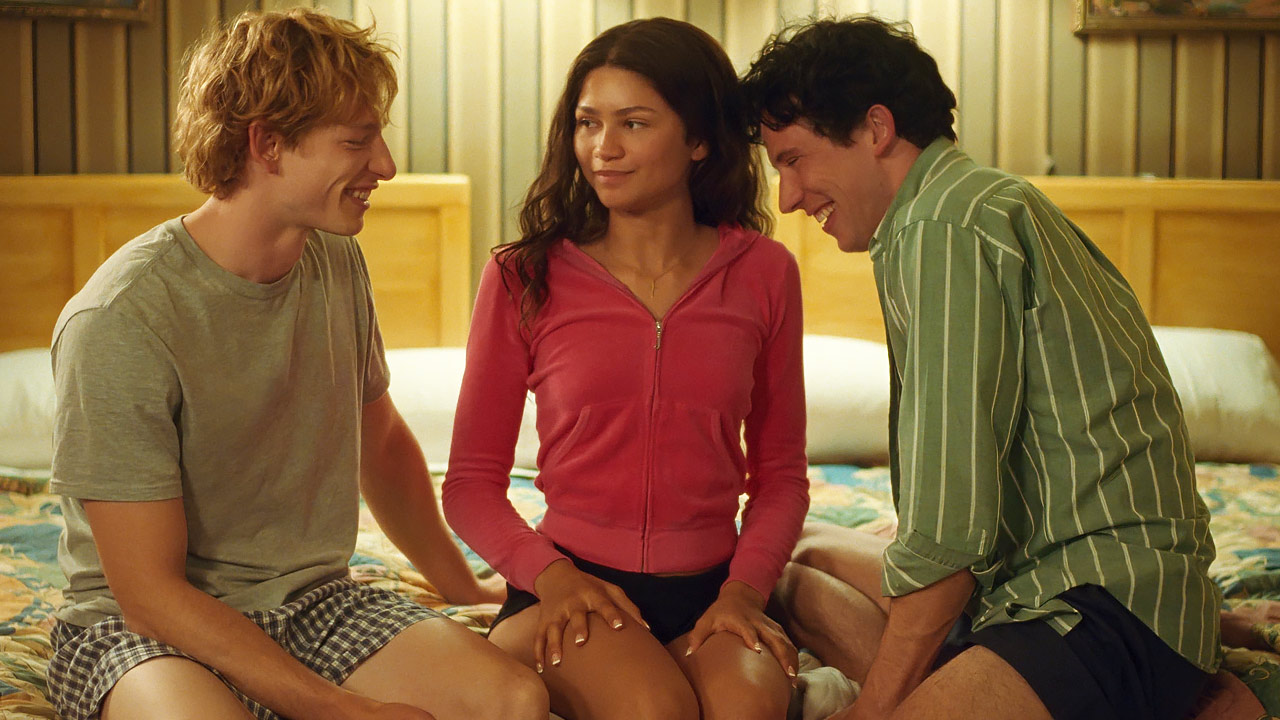Sexy, spritzy drama Challengers bounces through time like a tennis ball

Jumpy chronological pacing and hard-to-like characters would be an issue in most films. Not Luca Guadagnino’s entertaining Challengers, though: Luke Buckmaster appreciated the gameplay on and off the court.
There are many flashbacks and jumps forward in Challengers—so many that director Luca Guadagnino makes a game of them. Perhaps he wondered: how many can I get away with? For how long can I pogo the viewer across the space-time continuum? Evoking the metaphor of a game to describe the temporal leaps in this zestily made love triangle drama applies in the obvious senses—it’s very playful and fun—plus the more specific context of tennis: as smaller elements of a larger experience; parts that make up a whole.
Tennis is central to Challengers, first and most obviously in relation to the three lead characters, each of whom make comments about how they’ve spent their entire lives learning how to hit a ball with a racket. In the narrative present Tashi (Zendaya) is a retired player, now the coach and wife of Art (Mike Faist), a Grand Slam champion whose career is on the skids. The third side of the triangle is Patrick (Josh O’Connor), who never made the big time and schleps around, cashless, sleeping in his car, drifting between tournaments.
Art and Patrick are adversaries on the court with history and a complex dynamic between them, being former buddies competing for Tashi’s eye. The film’s centrepiece scene is a match between the two men that Guadagnino tantalizingly keeps cutting away from with an audacious kind of restlessness, not just to different scenes but different pockets of time. At one point I thought “finally, here we go!”—only for the film to, within seconds, whisk us back to eight years prior.
In other hands, all this messing around with the timeline would jar and rankle, or feel ostentatious and gimmicky. But the synergy between the form of the film and the sport it captures is quite something. I’d be surprised if Guadagnino wasn’t a tennis fan, and didn’t intentionally set out to mimic the sport’s rhythms. Sometimes the flow of the drama is steady and drawn-out: the equivalent of one of those epic rallies that seems to never end. Other times it’s abruptly uneventful—a double fault. Occasionally you can feel it racing ahead and going all-in, towards the point of no return—a player bolting towards the net.
The core plotline of Justin Kuritzkes’ wily script revolves around Art’s flailing but not yet over career. Tashi believes he has a confidence problem, and that he needs a win—any win—to get it back. Therefore she arranges for him to enter a “challenger” tournament, which are populated by low-ranking players, the logic being that he can trounce some poor schmuck and rekindle his mojo. This cheeky gambit results in a nightmare scenario for Art—with him facing off against Patrick, who he has never defeated, and with whom he of course has a fraught history.

Guadagnino—an Italian director best-known for his sublime queer romance Call Me by Your Name—deploys an arsenal of filmmaking techniques to make that central match tense and kinetic. Eventually the frame itself bounces around like a ball: served, volleyed, smashed. He also understands that human interplay is more interesting than the movement of felt-covered rubber and the position of players on a court; that good sporting drama equals good psychological drama.
The three principal characters—all engaging presences and none especially likeable—are the somewhat chequered soul of the film, brought to life by performances that feel almost uncomfortably believable, rooted as they are in nuanced personalities and conflicting motivations. Zendaya for me was the most impactful, giving Tashi a very spiky energy and a wobbly kind of moral or immoral compass: she seems to relish gamifying everything, even emotions and loyalties. Josh O’Connor imbues Patrick with bleary-eyed desperation, though there’s a smugness to him, a sheerly slappable demeanour, that avoids playing the heart strings: even in his darkest hour we don’t care if he wins or loses. Mike Faist is probably the most likeable as Art, but I wouldn’t want to overstate that; the film isn’t really behind him either.
It’s almost like Guadagnino is saying: films don’t need people to root for; you can root for the film itself. And what a hoot it is. There’s an aspect of European, perhaps even anti-Hollywood sentiment in Challengers, but it’s not the kind of experience multiplex audiences will find too distancing and cerebral. This is a charming, feisty film, that goes down easy and has some kick to it, like a spritzy summer cocktail.




















